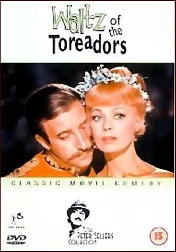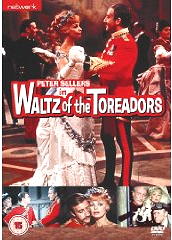Sun 6 Sep 2009
Movie Review: WALTZ OF THE TOREADORS (1962).
Posted by Steve under Films: Comedy/Musicals , Reviews[3] Comments
WALTZ OF THE TOREADORS. Independent Artists, 1962. Peter Sellers, Dany Robin, Margaret Leighton, John Fraser, Cyril Cusack. Based on the play The Waltz of the Toreadors by Jean Anouilh. Director: John Guillermin.

I don’t know if I’m alone in the US in this regard or not, but looking back through the IMDB credits for Peter Sellers, the first movie that he was in that I remember seeing was The Pink Panther, which came out in 1963. (I’ve never seen Lolita, which was also a 1962 release, so it looks as though I’m wrong. It’s a certainty that there were a few people who came in ahead of me.)
Then came Dr. Strangelove (1964), which I loved with a passion and could not figure out why none of my college housemates agreed with me. Sellers had been around a while before Waltz of the Toreadors, of course, but I seldom watched British films back then, mostly because I needed subtitles to understand them.
And yes, of course I’m exaggerating, but you know what I mean. They recently had an all-day extravaganza of Peter Sellers movies on Turner Classic Movies, and I taped most of them, telling myself that I couldn’t go wrong. Since I don’t lie to myself — well, hardly ever — I was right.
In Waltz of the Toreadors he plays a retired British officer around the end of the 19th century who has a problem. His wife being a nagging invalid, he has nothing to look forward to in that regard, but even worse, the true love of his life (the beautiful Dany Robin), with whom he has had an unconsummated love affair for 17 years, is coming from France, where he first met her, to take, she believes, her rightful place in his life.

The first half of this movie is then a comedy, with much mugging and horseplay and missed connections, male-female wise, or maybe that should be the first two-thirds. But quietly, it seems, and without much fanfare, the tone of the tale becomes more and more serious, and anyone who expected a happy (or happier) Hollywood ending in which all sides reconcile and make up and find true love — I think they’re going to be disappointed. Unmet expectations, and all that.
Given that the ending is at least somewhat more serious than the rest of the movie, then I think that there at least two problems. Why on earth, one might ask, does Ghislaine (Dany Robin) waste 17 years of her life pining for this general who is hardly worth crossing the street for, one realizes in retrospect, that retrospect being confirmed by the second problem, that General Leo Fitzjohn (that’s Sellers) has no intention of changing his view of the world (and his place in it, including his incredibly womanizing ways), will not change and does not change? Not a budge, not an inch, even when given a truckload of opportunities to do so.
English 101. How did this person’s character change during the course of this book? (Answer. Not at all. He’s as solid as brick.) I hated English 101, so maybe (an understatement) I’m still exaggerating.
On the other hand — and of course, there always is one — that’s the point, I believe, right there in the nut of the shell. What could be sadder than someone who doesn’t change? Or maybe the key word here is “can’t.”
September 7th, 2009 at 3:12 am
Never could warm to this one, good performances, but just not a favorite. Anoulith of course wrote Beckett and Anne of a Thousand Days — not exactly a comedy genius.
I don’t know which Sellars films TCM showed, but if you get a chance see The Mouse That Roared with Sellers in multiple roles, The Ladykillers (with Guiness — a classic), I’m Alright Jack, Two Way Stretch, Your Past is Showing, and Battle of the Sexes.
Two Way Stretch has Sellers masterminding a robbery for which he has the perfect alibi — he’s in prison. And Your Past is Showing has Sellers and other victims banding together to murder Dennis Price who is blackmailing them.
Still, knowing TCM you probably got tom thumb, The Party, The Millionairess, The World of Henry Orient, Strangelove, and with a little luck Heaven’s Above. All good, but only the last is truly classic Sellers from his early period.
I’ve never had any problem with English accents, but I do note BBCAmerica runs a little disclaimer about viewers using Close Captioning because even some Brits can’t follow all the accents, and at least one Brit film done in Scotland and one in the Midlands were released in England with subtitles.
And if you have never seen Lolita you should. Brilliant performances by Mason and Sellers. Once in a liftime role for Sue Lyon, and Shelly Winters for once is supposed to be annoying. Takes a lot of liberties with Nabokov, but in the end is truer to the spirit of the book than the more faithful Adrian Lynne version with Jeremy Lyons.
September 7th, 2009 at 11:35 am
I can’t say that I have an ending in mind for TOREADORS that I think would have worked out better than the one based on Anouilh’s play — not that I’ve seen the play, but no one’s said that they changed it for the movie — but the movie was certainly a lot more entertaining when it was a comedy.
As a tragedy, though, I’m still working it on it, but I strongly doubt it will ever become one of my favorites, either.
You’re right about most of the rest of the Sellers movies that were on TCM. Here’s the full list. I taped seven of them over the course of the day, last August 29th:
Your Past Is Showing
The Mouse That Roared
I’m All Right Jack
The Millionairess
Only Two Can Play
The Wrong Box
After the Fox
Murder by Death
Lolita
Waltz of the Toreadors
Two-Way Stretch
There’s A Girl In My Soup
The Party
September 7th, 2009 at 12:07 pm
The Wrong Box is a good deal of fun, not really a Sellers movie per se, but quite good, and based on the novel by Robert Louis Stevenson and Lloyd Osbourne, a comedy mystery about a tontine where everyone is trying to kill everyone else.
After the Fox isn’t bad, and has a first rate bit by Victor Mature sending his own image up.
Never cared much for There’s a Girl in My Soup. I think you’ll love The Mouse That Roared if you have never seen it, and I’m Alright Jack, Two Way Stretch, and Your Past is Showing are classic early Sellers.